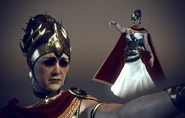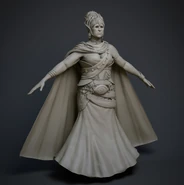| “ | Do not worry. The situation before me is clear. I have waited for this day. Your thoughts are clouded and your mind conflicted, warrior. I can feel it. You seek the truth? So be it. But remember, the truth always comes with a price. | ” |
–Aletheia's dying words to Kratos | ||
Aletheia (Greek: ἀλήθεια) was the Oracle of Delphi who helped Kratos in his quest to free himself from his blood oath to Ares and defeat the Furies who bound him to the insane war god.
Quick Answers

What role did Aletheia play in Kratos' quest to free himself from Ares?

What is the significance of Aletheia's position as the Oracle of Delphi?

What is the meaning of Aletheia in Greek?

How is Aletheia related to the Temple of Apollo at Delphi?

What is the history of the Delphic oracle where Aletheia served?

Greek Mythology
The Oracle of Delphi, commonly known as the Pythia, was the priestess at the Temple of Apollo at Delphi, located on the slopes of Mount Parnassus, beneath the Castalian Spring. The Pythia was widely credited for her prophecies inspired by Apollo. The Delphic oracle was established in the 8th century BC, there is evidence that Apollo took over the shrine from an earlier dedication to Gaia. Her oracular powers appeared to be associated with vapors from the Kerna spring waters that flowed under the temple. It has often been suggested that these vapors may have been hallucinogenic gases. The name 'Pythia' derived from Pytho, which in myth was the original name of Delphi. The Greeks derived this place name from the verb, pythein, which refers to the decomposition of the body of the monstrous Python after it was slain by Apollo.
God of War: Ascension
Aletheia was Orkos's lover, and she resided in the temple of the oracle. After discovering a plot by Ares and the Furies to overthrow Olympus, she and her beloved attempted to stop them by alerting Zeus of this. Before reaching Zeus, the Furies had her eyes, the source of her powers, brutally ripped out of her skull and transformed into a weapon that could wipe out any illusion, the Eyes of Truth, in order for all evidence of the devious plot to be rendered useless. After which, she was imprisoned by Pollux and Castor, who asked for tributes in return for an audience with her. After the defeat of the Gemini twins at the hands of the Spartan warrior Kratos, she told the ash-skinned warrior of a way to be free of his bond to Ares, in the cursed city of Delos, before dying of wounds accidentally inflicted on her in the battle between Kratos and the twins.
Powers and abilities
Being the Oracle of Delphi, Aletheia was blessed with the eyes of Truth, which have the following abilities:
- Illusion Awareness: Aletheia was able to see through illusions and even dissolve them. This makes her immune to the illusions cast by the Furies.
- Precognition: Aletheia's eyes gave her visions of the future, as well enlightened her on the plans of Ares.
Trivia
- The word Aletheia is the Greek and Ancient Greek word for truth. Parmenides, among other Greek philosophers, used the term to personify truth. Aletheia was known to the Romans as Veritas.
- In Greek Mythology, Aletheia was the name of the Goddess of Truth. The name of the Oracle of Delphi was actually Pythia.
- Adrianne Barbeau, the voice actor for Aletheia, also voiced Hera in God of War III.
- Unlike the Oracles whom the Ghost of Sparta was simply erratic or be off with them, Aletheia was one of few people who didn't earned Kratos' wrathful, contempt, or hatred as seen when Kratos genuine tender and comforting towards the Oracle and mourned her death.
- Aletheia prophesied the Olympus's destruction at the hands of the God of War, believing the vision to be about Ares (since he was in fact planning to take over the Olympus). To stop Ares, she helps Kratos, which allows him to break his blood oath and eventually become the God of War, to later destroy the Olympus. This is a common twist in Greek mythology, where trying to stop an oracle's vision from coming true only causes its eventual completion; a famous example being Oedipus.
- Kratos would later recount this story to Mimir and Freya during God of War Ragnarök.







